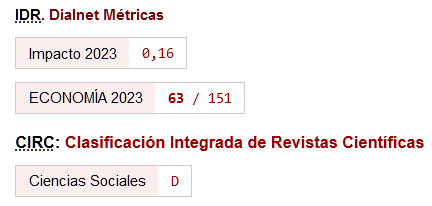Hacia una revisión crítica del análisis neoclásico del consumo: una alternativa basada en las necesidades
Keywords:
Consumer choice theory, Consumption, Human needsAbstract
Traditionally, the neo-classical theory of consumerchoice analyses consumer’s behaviour assuming exogenous generation of preferences, consumer sovereignty and utility of individual welfaremaximisation. This theoretical analysis appears to be limited in scopewhen it comes to understanding the real consumption process of mostpeople in rich societies. It is proven by empirical studies that increasesin consumption do not show to be clearly related to increases in indi-vidual utility of welfare. Many orthodox economists like Sen (1977),Stigler and Becker (1977) and Akerlof and Dickens (1984) have broa-dened the neo-classical framework by relaxing some basic assumptionsin order to enhance its explanatory power. In this paper it is argued thatthe incorporation of the key features of the theory of human need(Doyal and Gough, 1994) in the analyses of the consumption processleads to distinguishing among goods and services purchased depen-ding on them being generated by needs or wants. In this way the roleof the productive system in shaping and determining wants and theacquisition of need satisfactors is highlighted.
Downloads
References
Akerlof, A.G. y Dickens W.T. (1984/1990). The economic consequences of cognitive dissonance. En An economist theorist's book of tales. Cambridge: Cambridge University Press. https://doi.org/10.1017/CBO9780511609381.007
Deaton, A. y Muellbauer, J. (1980/1991). Economics and consumer behaviour. New York: Cambridge University Press. https://doi.org/10.1017/CBO9780511805653
Doyal, L. y Gough, I. (1994): Teoría de las necesidades humanas. Barcelona: Icaria/FUHEM.
Duesemberry (1949/1967). La renta el ahorro y la teoría del comportamiento de los consumidores. Madrid: Alianza editorial.
Eatwell J y Milgate M., Newman P. (1998). The new palgrave. A dictionary of Economics. McMillan Reference Ltd.
Esteve Mora, F. (1991). La evolución del consumo. En Etxezarreta, M., (coord.) La reestructuración del capitalismo en España, 1970-1990. Barcelona: FUHEM- Icaria.
Fine, B. y Leopold, E. (1993). The world of consumption. London: Routledge.
Galbraith, J.K. (1958/1987). La sociedad opulenta. Barcelona: Ariel.
Gough, I. (2000). Global capital, human needs and social policies. Houndmills: Palgrave. https://doi.org/10.1057/9780230289093
Hicks J. (1981/1986). Riqueza y bienestar. Ensayos sobre teoría económica. México: Fondo de cultura económica.
Hodgson G. (1986). Behind methodological individualism. Cambridge Journal of economics, 10, 211-124. https://doi.org/10.1093/oxfordjournals.cje.a034996
Keynes, J.M. (1931/1989). Economic possibilities for our grandchildren. En J. M. Keynes Essays in persuasion. Cambridge: The Macmillan press Ltd.
Marshall, A. (1890/1994). Principles of Economics. (8ª ed). London: Mc Millan.
Mill J.S. (1863/1980). El utilitarismo. (6ª ed). Buenos Aires: Aguilar Argentina.
Miller H.B. y Williams H.W. (1982). The Limits of Utilitarianism. Minneapolis: University of Minessota Press.
Muñoz J. y Jorda D. (1993). El consum privat a Catalunya. Nota d'Economia, pag. 47.
Nicolaides P. (1988). Limits to the expansion of neoclassical economics. Cambridge Journal of Economics, 12, 313-328.
Programa de las Naciones Unidas para el Desarrollo. Informe sobre el desarrollo humano, 1998. Madrid: Mundi-Prensa.
Samuelson P.A. (1948/1981). Curso de economía moderna. (17ª ed). Madrid: Aguilar.
Scitovsky T. (1986). Frustraciones de la riqueza: las satisfacciones humanas y la insatisfacción del consumidor. México D.F.: Fondo de Cultura Económica.
Sen A. y Williams B. (1982). Utilitarianism and beyond. Cambridge: Cambridge University Press.
https://doi.org/10.1017/CBO9780511611964
Sen A. (1977). Rational fools: a critique of the behavioural foundations of economic theory. Philosophy and public affairs, 4 (Vol.6), 317-345.
Stigler G.J. y Becker G.S. (1977). Gustibus non est disputandum. American Economic Review, 67, 76-90.
Torres Lopez J. (2000). Economía política. Madrid: Pirámide.
Vaan Praag, Bernard M. S. (1968). The individual welfare function a preliminary approach. En Vaan Praag, Bernard M. S. Individual welfare functions and consumer behaviour. Amsterdam: North Holland Publishing Company.
Varian H.R. (1987) Microeconomía intermedia. Barcelona: Antoni Bosch, editor.
Winston C. G. (1980). Addiction and Backsliding. A theory of compulsive consumption. Journal of Economic Behaviour and Organisation, 1, 295-324. https://doi.org/10.1016/0167-2681(80)90009-8
Woolley R.W. (1993). The feminist challenge to neoclassical economics. Cambridge Journal of Economics. 17, 485-500. https://doi.org/10.1093/oxfordjournals.cje.a035251
Downloads
Published
How to Cite
Issue
Section
License
This licence allows third parties to share (copy and redistribute the material in any medium or format) and adapt (remix, transform and create from the material for any purpose, including commercial purposes), provided that authorship and first publication in this journal (The Journal, DOI of the work) is acknowledged, a link to the licence is provided, and it is stated whether changes have been made to the work.







